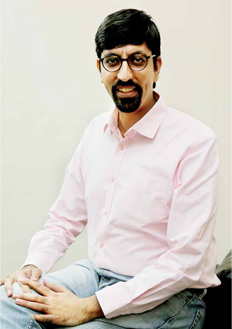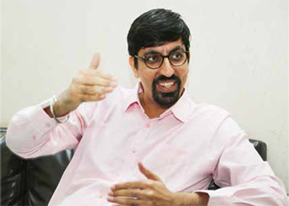A visiting faculty at IIMs specializing in Human Resource Management and Marketing Management, Sahil Nayar, a Human Capital Leader working at a leading professional services firm in the country, believes that we need to be agile to be relevant and that is the only way to thrive in today’s times. In an interview with Corporate Citizen he shares his ideas on how the HR will stay relevant in this rapidly changing times

Many people say that their careers happened by default or by careful planning and execution, as cliché as it may sound, I was always looking out for a space, essentially a white space, where there are really few good people, so it becomes far more easier to make your mark.
I passed my Board examinations with 85%, and in one of my conversation with my father, who is a dentist, I remarked, 'I want to become like you, because there is so much respect for doctors and I also want to be a dentist just like you are’. He mentioned one thing which was not just thought provoking but also life defining for me. He said, ‘If you choose science as your career then you will be among the bottom of the class but, if you choose commerce then you will be with the top among the batch. So what is that you want to do?’ That conversation got me thinking. I thought on his advice and I went on to do my Bachelor of Management Studies (BMS), from H.R. College of Commerce and Economics and then completed my Masters’ in HR from University of Mumbai followed by a degree in law (LLB) as well.
I started my first job post my 10th standard examinations. At that time I wanted to earn my own pocket money, so that I could buy gadgets for myself. I was a gadget enthusiast and whenever there was any new technology or a new gadget in the market, I wanted to buy it but more importantly with my own money. I used to study and do a part-time job. Today, life has changed so much with the competition in the telecom space but those were the days when I used to sell sim cards for Rs.100 each.
Later, I went on to work for an equity research firm helping them with their business development whilst pursuing my studies from HR College. That’s when the teaching bug bit me as well and I started teaching. As I did my Master’s in Human Resources I would teach graduate students, progressing to teaching Part Time MBA students post my Masters. By the time I completed my MBA, recession had hit India. I will never forget three people in my life who got me a job at that point in time-Mr. Vidyadhar Kulkarni-my placement coordinator who put my candidature through to the company, Mr. Pujit Aggarwal-the CEO and Mr. Rakesh Raina-the then Head of HR to have found me worthy. While my peers struggled, I landed myself a job. A year and a half with that real estate firm having dirtied my hands, I moved to a very different domain of suits and ties-consulting. It has been almost eight years since then at this organization and there has been no looking back since then.
Today, everyone is talking about how HR will no longer exist in few years. I don’t understand why there is a debate on the existence of HR and the value that HR brings in. AI will bring in the technology part but the human touch, will always be there
I have experienced significant and numerous changes but one thing that has been constant is the entire credibility that HR is trying to battle with. Today, everybody talks about Artificial Intelligence (AI), Machine Learning, Internet of Things (IoT) and so on. In the various marketing conferences that I have attended, I have never came across anyone talking whether marketing is relevant, is it adding value, etc. No one talks about it. Today, everyone is talking about how HR will no longer exist in few years. I don’t understand why there is a debate on the existence of HR and the value that HR brings in. AI will bring in the technology part but the human touch, the emotion aspect will always be there. For example, if you lost your credit card, would you be interested in talking to a machine, which will say don’t worry, your credit card has been blocked or would you prefer talking to a human being? It is that social angle that gives so much of comfort and reliability. I don’t think that the human touch would be replaced by machines. Machines will only help us to improve the efficiency of our work, but not replace human beings. The question changes if robots aided by machine learning on the other end of the call, start talking and responding like humans.
Millennials are digital natives, technology comes naturally to them. But the older generation people have to adapt to the newer technologies and keep themselves updated on the run. Their generation used to visit temples, this generation plays Temple Run on their phones. My friend’s six-monthold son will not eat his breakfast unless he has an iPad in his hand. Today, all the games are not played on playgrounds but are played on smartphones. The newer generation is that technologically inclined. That is one generation, on the other hand there is another generation who are in their 50’s - 70’s, they have so much knowledge, so much experience but they might not be best at articulating and the youngsters of today who don’t have patience are not able to understand what they are trying to say. The ability is to manage this multigenerational workforce together and leverage on each other’s strengths so the organization can thrive. To my mind, respect is key. Learning agility keeping aside, the ego always allows room for improvement.
We cannot predict what sort of challenges will be coming our way after three months or three years. We are not able to predict the future with reasonable amount of certainty

I think two key skills are needed. Firstly, the ability to know what will come and hit you, few years down the line. I think we don’t do enough of that—thinking of the future and the road we are on, how it will affect the manner in which we are doing business today. We cannot predict what sort of challenges will be coming our way after three months or three years. We are not able to predict the future with reasonable amount of certainty. Because of that, all our responses are reactive, they are situational. They are not proactive. Secondly, we as humans are not very agile, we operate through our comfort zones and not through the adventure zone. The adventure zone is always out of the comfort zone. When you are on a cliff, there are two chances, either you come back when it is very slippery or take-off when it is the time to take-off. What I am trying to say is, somewhere you need to understand what the future is like and ask a question to yourself that are you experiencing tomorrow-today. For an HR function, are they able to understand how is retention happening, how loyalty is changing, why are people leaving organizations every two to three years, what is an inherent need of an employee and how are you going to fulfil that need. If you are not able to get that pulse and develop what I call a stickiness factor, what is the point of HR analytics, it will give you just the data and at best information and information on analysis will give you insights. The question is how you will use that insight to get to the stage of being predictive. You should be able to say, this is the current trend in the market and I think in the next three months this is going to happen and say it with conviction. And when that happens, the entire boardroom will listen to you. That is how one builds credibility.
I significantly believe that there is a gap, for two to three reasons. First, curriculum is not regularly updated, from a university perspective. For deemed universities or PG programs, since they are less controlled by the government regulations they can take decisions on their own. I think corporate India needs to play its role to bridge the gap. A lot of organizations have their employees who visit certain colleges and tell the colleges this is what we want you to cover as part of syllabus. I advise numerous educational institutes on their teaching pedagogy, what are the skillsets of today, what are we hiring for and therefore how should they prepare the students who will be industry ready. During this process, as students are part of the journey, we are helping them to be ready, the moment they step out of the college, we are waiting to absorb them. We need to co-create the talent of tomorrow, today.
I think social media knowledge is extremely important, consider your target audience, they are not sitting at an employment exchange, where two-three decades ago our parents used to go and submit one page CV to say if any opening comes up, let us know. Life has changed, organizations have moved to social media, and a lot of hiring, apart from hiring partners, internal job referrals, a significant part of the recruitment pie comes from social media. Social media is all about here and now. Today, it is no longer the time where only employers are choosing employees, talented employees are also choosing employers. An organization’s Employer Brand is being rated consistently. How does the Employee Value Proposition stand against its competitors is also equally important.
I think we need to spend enough time to understand what triggers them. Millennials are not eccentric, they have a reason for doing things, and I think we need to identify those triggers. For them organizations need to mirror society and when that doesn’t happen in more cases then they would like or so to say cross their tolerance level they go searching greener pastures. My favorite example here is the Mobile Phone face recognition. If they can unlock their phone through the retina in their eye, why do they have to key in a complicated password with a numeric, special character and minimum number of characters to unlock their computers- more importantly keep changing it periodically.
By Vineet Kapshikar